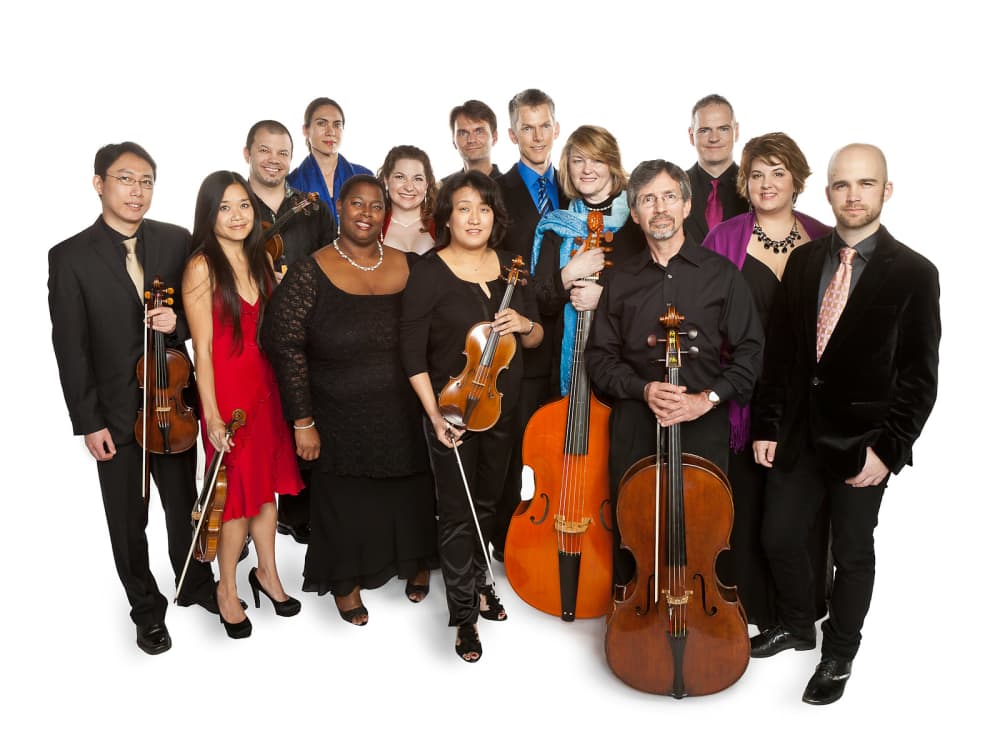A match made in heaven
Get happy: Ars Lyrica and Orpheus Chamber Singers explore the joyful, festiveside of Bach
 Ars Lyrica presents "Magnificat" on Saturday, 7:30 p.m. at Hobby Center for thePerforming Arts.Photo by Anthony Rathbun
Ars Lyrica presents "Magnificat" on Saturday, 7:30 p.m. at Hobby Center for thePerforming Arts.Photo by Anthony Rathbun The previous time Ars Lyrica and Orpheus Chamber Singers mingled resources wasin 2010 for Monteverdi's Vespro della Beata Vergine 1610.Photo courtesy of Orpheus Chamber Singers
The previous time Ars Lyrica and Orpheus Chamber Singers mingled resources wasin 2010 for Monteverdi's Vespro della Beata Vergine 1610.Photo courtesy of Orpheus Chamber Singers
Ask anyone to hum a tune by Bach — and I am willing to put cash behind this prediction — and most likely they will default to the intimate Prelude of the Suite No. 1 in G Major for Unaccompanied Cello.
Be it because of our need for a quiet, introspective respite from the noise of 21st century living, because its inclusion in many television shows and films, or because every musician will study it, practice it and perform it regardless of their instrument, modern zeitgeist identifies with Bach's introspective compositions before his magnum opera, the Mass in B Minor or St. Matthew's Passion, for instance.
True, high on the popularity scale are the serene second movement of the Orchestral Suite No. 3 in D major, better known as Air on the G String, and the more robust, pesante — dare I say happy? — Brandenburg Concerto No. 3 in G major.
"The placement of the sound is further forward in the mouth; and we lighten our voices to soar through the challenging virtuosic choruses with ease."
As a test to what the social media sphere thought about his style, I challenged my collective Facebook network to describe Bach's music in one word. Amid the responses were perfection, masterful, beautiful, logical, godly, revolutionary, definitive and ethereal — and therapy.
Jerry Ochoa of indie ensemble Two Star Symphony offered, and appropriately so considering the nearly-impossible polyphonic feats Bach was able to execute, "Ugh, math is hard." Composer Richard Ford couldn't help being a prankster and post, "Who?"
As Ars Lyrica Houston artistic director Matthew Dirst was crafting the playbill for this weekend's performance in Houston and Dallas, in collaboration with the Dallas-based Orpheus Chamber Singers, he turned to a different side of Bach. Business development specialist Molly Block chimed in with joyful — and that's just one of the more accurate descriptors for his Magnificat in D major — in addition to divine, pun intended.
The 30-minute Magnificat, whose 12 movements anchor the program, calls for major musical prowess: A full baroque orchestra with traverso flutes, oboes, bassoon, trumpets, strings, percussion and continuo. Top that with a five-part chorus and five soloists. Yes, it's a beast, and a "happy" one indeed.
"It's celebratory, festive music," Dirst explains. "The Magnificat text is the kind of spiritual center that mirrors the theme of this year's season, Anticipations. The words are known as the Canticle of Mary and tells the story of the Virgin Mary as she awaits the Annunciation from the angel Gabriel, the birth of Jesus Christ."
Interestingly, the previous time Ars Lyrica and Orpheus Chamber Singers mingled resources was in 2010 for Monteverdi's Vespro della Beata Vergine 1610, which also sets the the text of the Magnificat. It was reviewed by the Dallas Morning News as "daring and vivid as any brand-new composition."
A match made in heaven, perhaps?
"They've been performed in so many subsequent coronations that the piece has become a nation's feel-good response to the next leader. The proximity to the election? Well, that was an added bonus."
Orpheus founder and artistic director Donald Krehbiel knew Dirst by reputation; they were both students at Southern Methodist University at different times. And as both groups were seeking to expand their audiences across the state, Texas-big early works like Vespers and Magnificat came to be the logical vehicle to generate buzz and excitement in both markets.
Yet Krehbiel's group leans more toward the music of the Renaissance and 19th and 20th centuries. As such, the overall sound aesthetic of the Orpheus Chamber Singers gravitates to warmer, rich sonorities. But the agility required to pull off Bach's coloratura passages demands a contrasting, brighter approach. Otherwise the effect is heavy, laborious and, as most Bach devotees would remark, blasphemous.
"For the music of Bach we alter how we physically sing," Krehbiel explains. "The placement of the sound is further forward in the mouth; and we lighten our voices to soar through the challenging virtuosic choruses with ease."
With the massive musical forces summoned to enliven Bach's Magnificat, Dirst curated the rest of the program to take full advantage of his investment. After all, underwriting orchestras, especially a troupe that specializes in period instruments, doesn't come cheap.
Give the flutes a break and you have the instrumentation for George Frideric Handel's Coronation Anthems, also celebratory and anticipatory in nature. Written for the coronation of George II of England and Queen Caroline in 1727, with text from the King James Bible, the jubilant melodies anticipate a change in regal leadership, Dirst says.
"They've been performed in so many subsequent coronations that the piece has become a nation's feel-good response to the next leader," Dirst continues.
"The proximity to the election? Well, that was an added bonus," he quips.
Also on the program are works by Georg Philipp Telemann and Giovanni Gabrieli.
___
Ars Lyrica presents "Magnificat" on Saturday, 7:30 p.m. at Hobby Center for the Performing Arts. Tickets start at $35 and can be purchased online or by calling 713-315-2525.
